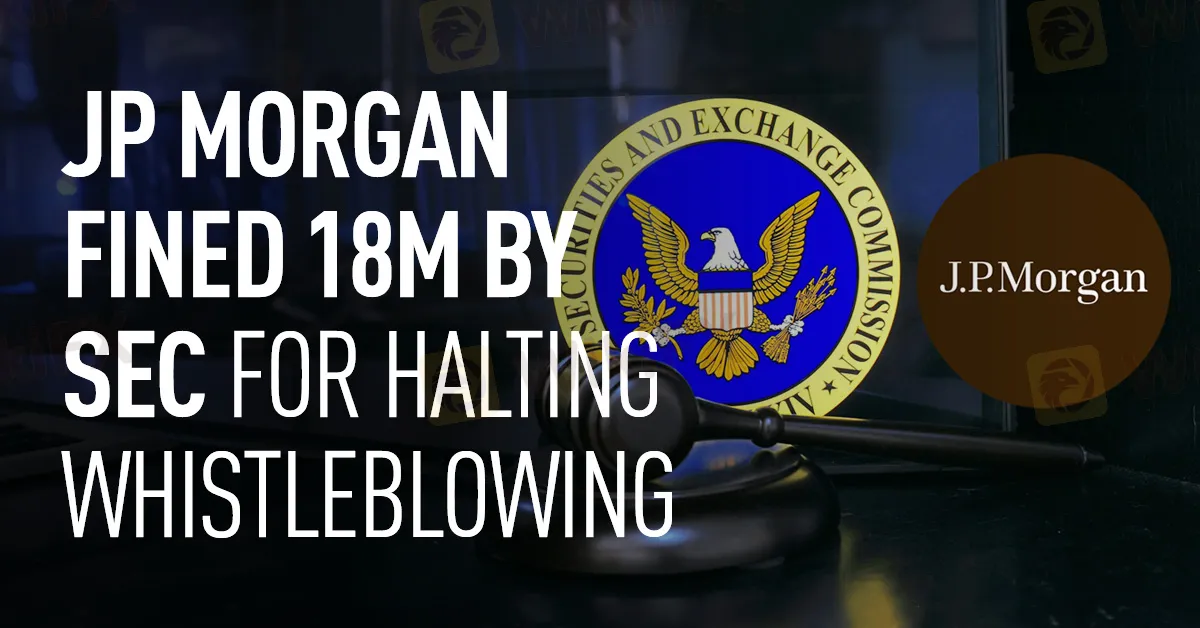简体中文
繁體中文
English
Pусский
日本語
ภาษาไทย
Tiếng Việt
Bahasa Indonesia
Español
हिन्दी
Filippiiniläinen
Français
Deutsch
Português
Türkçe
한국어
العربية
JP Morgan Fined 18M by SEC for Halting Whistleblowing
Abstract:JP Morgan Securities settles SEC charges of obstructing clients from reporting securities law violations, agreeing to an $18 million penalty for requesting confidentiality agreements from clients receiving settlements exceeding $1,000.

On Tuesday, the Securities and Exchange Commission (SEC) made an announcement regarding JP Morgan Securities LLC (JPMS), revealing the settlement of charges related to obstructing advisory clients and brokerage customers from reporting potential securities law violations. As part of this resolution, JPMS has agreed to pay an $18 million civil penalty.
The SEC's order outlines that JPMS was involved in the practice of requesting retail clients to sign confidential release agreements between March 2020 and July 2023. These agreements were presented to clients who had received credits or settlements from the firm exceeding $1,000. The terms of these agreements obligated clients to maintain confidentiality regarding the settlement, underlying facts, and information related to the specific account. Notably, while clients were allowed to respond to SEC inquiries, they were expressly prohibited from voluntarily contacting the SEC.

Gurbir S. Grewal, the SEC's Director of Enforcement, underscored the illegality of including provisions that impede individuals from reporting wrongdoing to the SEC. Grewal expressed concern that the practice, spanning several years, presented clients with the difficult choice of receiving settlements or credits from the firm while refraining from reporting potential securities law violations to the SEC. This situation, according to Grewal, not only undermined critical investor protections but was also deemed illegal.
Corey Schuster, Co-Chief of the Enforcement Divisions Asset Management Unit, emphasized the significance of ensuring that confidentiality agreements do not obstruct potential whistleblowers. Schuster stressed the importance of investors, whether retail or otherwise, being free to report complaints to the SEC without encountering any interference.
The SEC's order found JPMS in violation of the Rule under the Securities Exchange Act of 1934, a whistleblower protection rule prohibiting actions hindering individuals from communicating directly with SEC staff about potential securities law violations. Without admitting or denying the findings, JPMS has agreed to be censured, cease and desist from violating the whistleblower protection rule, and pay the $18 million civil penalty.
In 2022, the SEC took action against and reached settlements with J.P. Morgan Securities, UBS Financial Services, and TradeStation Securities for deficiencies in their identity theft prevention programs. These broker-dealers, without admitting guilt, allegedly violated the Identity Theft Red Flags Rule. Under cease-and-desist orders, JP Morgan faces a $1.2 million penalty, UBS $925,000, and TradeStation $425,000. The SEC highlighted shortcomings in oversight, staff training, and program updates, underscoring the need for enhanced customer protection.

Disclaimer:
The views in this article only represent the author's personal views, and do not constitute investment advice on this platform. This platform does not guarantee the accuracy, completeness and timeliness of the information in the article, and will not be liable for any loss caused by the use of or reliance on the information in the article.
Read more

CME International Records a Massive Jump in Forex Volumes
CME International recorded a record surge in its foreign exchange trading volumes during the second quarter. Check out its performance across products and markets.

IMF Warns of Global Risks as US Slaps 50% Tariffs on Import
The IMF warns of rising global uncertainty after the US imposes a 50% tariff on copper and Brazil imports. Factories worldwide brace for economic fallout.

FCA’s Tech Crackdown Suspends 1,600+ Financial Sites
The FCA’s 2024 report details a tech-driven crackdown on financial crime, suspending 1,600+ sites and increasing firm authorisation cancellations in the UK.

FCA’s Tech Crackdown Suspends 1,600+ Financial Sites
The FCA’s 2024 report details a tech-driven crackdown on financial crime, suspending 1,600+ sites and increasing firm authorisation cancellations in the UK.
WikiFX Broker
Latest News
Top Wall Street analysts are upbeat about these dividend-paying stocks
Singapore's economy grows 4.3% in second quarter, beating expectations
What WikiFX Found When It Looked Into Emar Markets
MT4 vs MT5 Which Forex Trading Platform Fits Your Needs in 2025?
Stock futures slide on more Trump tariff letters, but are off worst levels of session: Live updates
Short or Long Term: Which to Choose for Double-Digit Returns from Gold Investments?
Gold Soars Above $3,350 as XAU/USD Rallies on Trade Tensions
Asia-Pacific markets trade mixed as investors assess Trump's latest tariff threats; bitcoin hits new highs
What is Forex Trading Simulator?
Switzerland tourism boosted as women's soccer continues record-breaking rise
Currency Calculator



